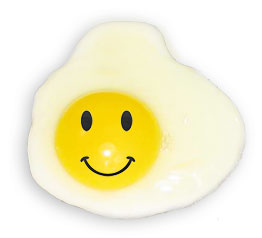
YesNoYesNoYesNoYesNo |
| it is not an easy task sifting through mountains of information on supplements and vitamins, touting with promises of health and longevity, stronger bones, better memory, smoother skins, extended erections, anti-this and anti-that. Full of promises yesterday, debunked today. Yesterday's herbal rage, today's snake oil. Or sometimes, debunked yesterday, but finding new life, new uses. It is the frustrating YesNoYesNo of not just vitamins, minerals, supplements, and foodstuff (eggs, alcohol, caffeine, chocolates, etc) but also of prescription pharmaceuticals that somehow managed to slide through the supposedly rigorous standards of testing, only to be shown later on, after reports of adverse reactions and deaths, to be toxic and unsafe. |
Eggs • Vit D • Calcium • Chocolates • Wine • Aspirin • Caffeine • Medicines • Supplements |
The egg |
||||||||||||||||||||||||||||||||||||||||||
 |
||||||||||||||||||||||||||||||||||||||||||
I grew up at a time when a healthy diet meant three squares a day, when we ate with gusto and unconcerned indulgence. The blind indulgences included eggs, every which way you can – fried, boiled, soft-boiled, salted, scrambled, sunny-side-up, omelets, flans, or raw on rice or straight down the gullet; later on, deviled, eggnogs, eggs-Benedict, custards, and a gazillion of egg-rich pastries and culinary delights. Then science and medicine sneaked into the kitchen and dining table, said "uh-uh," came up with the food Pyramid, introduced cholesterol into public awareness, warned of the terrors of lipid-laden plaque-inducing foods, and put cholesterol-rich eggs on the No-No list. The number was compelling – 213 mg of cholesterol in a single yolk! For some, it exceeded the prescribed limits; for many, it didn't leave much room for anything else laced with cholesterol after breakfast. The cholesterol scare spawned an anti-yolk killer-egg industry – egg substitues (ugh!) and all-white omelets (uugghh!!). As a physician, I preached a convincing anti-yolk spiel, connecting the dots of cholesterol, heart attacks, and strokes; while I would occasionally sneak into a two-egg indulgence, once a month or two, dipping slivers of bread into that forbidden mound of yolk – yes! living dangerously; and suicidally, I thought, when I would make a plateful or two of custard disappear before my eyes. And when I would make a six-egg-five-white-one-yolk omelet, I'd eat it with a sense of disciplined superiority and resignation, suffering the taste for the sake of health, and then, watch the kitchen staff, beneficiary of my fears, whip up a rural yolky delight, envying their youth and their arteries, as they indulge in cholesterol overload with my throw-away yolk. That was then. Science taketh away, science giveth back. The egg has made a comeback. Outdated notions on the yolk have been nullified. Studies have pecked away at the bad and the ugly. What remains is the good egg. |
||||||||||||||||||||||||||||||||||||||||||
Nutritional Info |
||||||||||||||||||||||||||||||||||||||||||
| Cholesterol Values The table is included not for its relevance with the egg debate, but rather as a reference table. While many patients are still being advised against the inclusion of eggs in their daily diets, a review of their lipid profile reveals values well within normal, certainly not warranting the strict restrictions being advised. There is also a common difficulty in remembering the "good" HDL from the" bad" LDL.
|
||||||||||||||||||||||||||||||||||||||||||
| Studies • Yes / Egg and Cardiovascular Disease: (1) A 2007 study of nearly 10,000 adults demonstrated no correlation between moderate (six per week) egg consumption and cardiovascular disease or strokes, except in the subpopulation of diabetic patients who presented an increased risk of coronary heart disease. (2) Choline is involved in the breakdown of homocysteine, an amino acid that is related to an increased risk of heart disease. Choline deficiency results in increased homocyteine levels. The choline content may explain why research has shown healthy adults can consume eggs without increasing risk of heart disease. • No / Egg and T2 Diabetes: A 14-year Harvard School of Public Health study of 117,000 nurses found no difference in heart disease risk between those who ate one egg a week vs those who ate one egg a day. • Yes / Egg and T2 Diabetes: Although past data suggested a link between high egg consumption and increased for type 2 diabetes, a 2010 study found no link between egg consumption and type 2 diabetes. • Yes / Egg Carotenoids and Eye Health: (1) Eggs are high in lutein (L) and zeaxanthin (Z), collectively the macular pigment (MP) which may be protective to the retina and reduce the risk of developping AMD (age-related macular degeneration). A study showed consuming 2 eggs daily was associated with in increase in circulating L/Z without a change in blood LDL. (2) Another study suggests daily egg consumption lowers the risk of developing cataracts, also because of the L/Z content. • Yes / Two-Egg Diet: In 2008, the European Journal of Nutrition published a study that showed people who ate two eggs a day, while on caloric restriction, lost weight weight and reduced blood cholesterol levels. • Yes / Egg and Breast Cancer: (1) Research suggests that teenage girls who regularly eat eggs are less likely to develop breast cancer later in life. (2) In a case-controlled study of 3,000 adult women, the risk of developing breast cancer was 24 % lower among women with the highest intake of choline. • Yes / New Analysis: Less Cholesterol, More Vitamin D: New USDA study reports eggs, on average, have 14% less cholesterol and 64% more vitamin D compared to the last analysis done in 2002. |
||||||||||||||||||||||||||||||||||||||||||
 Yes. Yes.The skinny on the egg. It's a chock-ful of good. Size-for-size, possibly one of the healthiest food. An excellent source of protein and essential nutrients. Low in unsaturated fats, high in polyunsaturated and monosaturated fats. High in choline and vitamin D. Good for the eyes with its lutein and zeaxanthine. Some say 2 eggs a day is fine. Some advise moderation with one a day. If you're diabetic, some advise to limit eggs to less than 7 a week. Off with egg substitutes. Off with all-white omelets. Off with guilt. Enjoy the true omelet. Feast on the leche flan. Welcome back the yellow yummy yolk! |
||||||||||||||||||||||||||||||||||||||||||
• |
||||||||||||||||||||||||||||||||||||||||||
| Additional
Sources and Suggested Readings (1) Eggs: Dietary Friend or Foe? / Star Lawrence / WebMD (2) Egg consumption and risk of type 2 diabetes in men and women / Djousse L, Gaziano JM et al / (3) The Pros and Cons of Eggs / Kari Hartel, RD, LD (4) Where Do Eggs Fit in a Heart-Healthy Diet?: Egg Carotenoids and Eye Health / Joanne Curran Celentano PhD / Medscape Internal Medicine / (5) Essential nutrient found in eggs reduces risk of breast cancer by 24 percent / EurekAlert (6) USDA: Eggs' Cholesterol Lower Than Thought, Vitamin D Higher / David Katz, MD / Huffpost Health (7) Less Cholesterol in Eggs, USDA Says / New Analysis Finds 14% Less Cholesterol in Eggs, 64% More Vitamin D / Kathleen Doheny / WebMD Health News |
||||||||||||||||||||||||||||||||||||||||||
| Image source: David Benbennick's Egg & Yolk / modified by G. Stuart | ||||||||||||||||||||||||||||||||||||||||||


